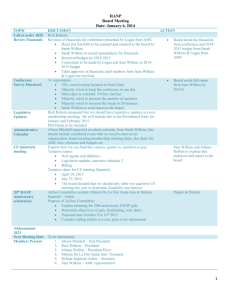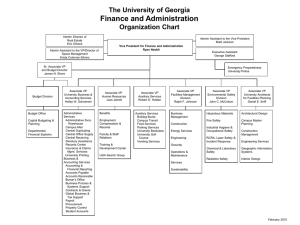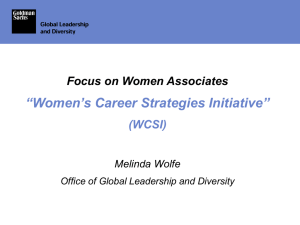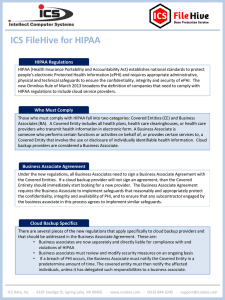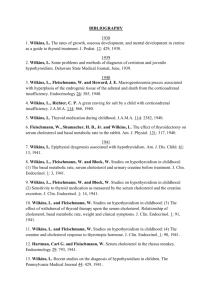Presentation - Financial Management Institute of Canada
advertisement
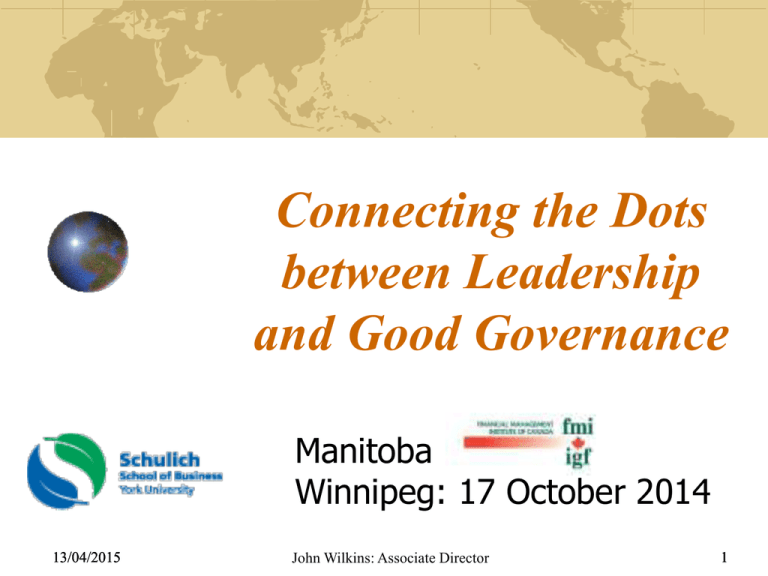
Connecting the Dots between Leadership and Good Governance Manitoba Winnipeg: 17 October 2014 13/04/2015 John Wilkins: Associate Director 1 Outline The beauties of nature come in all colours. The strengths of humankind come in many forms. Every being is wonderfully unique. All of us contribute in different ways. When we learn to honour our differences, and appreciate the mix, The strategic challenge Leadership roles Leadership values Leadership competencies Leadership development The emerging vision We find Harmony. 13/04/2015 John Wilkins: Associate Director 2 13/04/2015 John Wilkins: Associate Director 3 Principles of Good Governance Governance is the formation and stewardship of the formal and informal rules that regulate the public realm, including its political, economic, and social dimensions. Good governance enables the development of public value through institutions and processes that promote: Accountability Transparency Predictability Participation Capacity. 13/04/2015 John Wilkins: Associate Director 4 DM/CAO Priorities 92.7% Building leadership capacity 78.7% Measuring outcomes 75.4% Implementing service innovations 72.6% Enhancing staff attitudes and values IPAC 2014 13/04/2015 John Wilkins: Associate Director 5 Strategic Public Manager Framework GLOBAL THINKING GOOD PRACTICE POLITICAL-ADMINISTRATIVE INTERFACE Managing Up GOOD GOVERNANCE Managing Within LEADERSH IP LEGACY Managing Self PUBLIC SERVICE RENEWAL Managing Across EMPLOYEE ENGAGEMENT Managing Down Managing Forward ©John Wilkins 2014 13/04/2015 Managing Beyond 6 Strategic Leadership “It’s time we recognize that BBC (1981): Yes Minister management and leadership are two sides of the same coin. Nobody wants a manager who is not a leader, but nobody should want a leader who is not a manager. This idea that you can sit up on high and do the big stuff and everybody runs around doing the grunt work is very destructive. Instead, we need to build communities.” Henry Mintzberg (2007) 13/04/2015 John Wilkins: Associate Director 7 Leading at the Centre of Government ROLE MINISTER DEPUTY MINISTER Maker Advisor OVERSIGHT Reviewer Enforcer POLITICALADMINISTRATIVE INTERFACE Delegator Coordinator POLICY 13/04/2015 John Wilkins: Associate Director 8 Leading on the Front Lines ROLE POLITICIAN LOCAL HERO Spokesperson Mediator PARTNERING Strategist Negotiator CITIZEN-CENTRED SERVICE Consultant Deliverer COMMUNICATION 13/04/2015 John Wilkins: Associate Director 9 Leading from the Middle Out ROLE SENIOR EXECUTIVE MIDDLE MANAGER Model Messenger INNOVATION Marketer Inventor ACCOUNTABILITY Enabler Reporter INTEGRITY 13/04/2015 John Wilkins: Associate Director 10 Propositions Tested Collaborative leadership prevails in thought and practice over the transformational leadership of the NPM era. Middle managers are emerging as the true change makers and disciples of reform in today’s networked government. Contemporary ethical crises have more to do with the motivations of individual leaders than with failures of governance or leadership. 13/04/2015 John Wilkins: Associate Director 11 New Evidence >80% of innovations are championed by teams led by senior or middle managers, followed by freelance field operatives and politicians. >80% of innovations deploy partnerships, whether intragovernmental, intergovernmental, public-private, or public-private-people. 2011-12 CAPAM International Innovations Awards 13/04/2015 John Wilkins: Associate Director 12 Conventional Wisdom Debunked X Central agency managers are the natural change leaders in government due to position power, access to power, reach, and influence. X Front-line managers are the natural change agents in government. X Middle managers are too limited in status, power, access, and reach to influence change. 13/04/2015 John Wilkins: Associate Director 13 13/04/2015 John Wilkins: Associate Director 14 Reframing the Issue Corruption Focus Criminalization Personal choices Tough and enforceable justice system Symptom of failed rule of law Anti-corruption institutions More accountability = less corruption Combating problems 13/04/2015 Integrity Focus Cultural values Generational issue Fair and equitable democratic institutions Symptom of failed governance Holistic societal approach More transparency = less corruption Institutionalizing change John Wilkins: Associate Director 15 Personal Values If you could have only one of the following, which one would you choose? Why? 1. A satisfying and fulfilling marriage. 2. Complete self-confidence, with a positive outlook on life. 3. Success in my chosen career. Now, if you could have only one of the following, which one would you choose? Why? 4. Freedom to do what I want. 5. A world without prejudice. 13/04/2015 John Wilkins: Associate Director 16 Management Accountability Framework Public Service Values By their actions departmental leaders continually reinforce the importance of PS Values and Ethics in the delivery of results to Canadians (e.g.: democratic, professional, ethical and people values). Policy and Programs Governance & Strategic Direction The essential conditions – internal coherence, corporate discipline and alignment to outcomes -- are in place for providing effective strategic direction, support to the Minister and Parliament, and the delivery of results. Departmental research and analytic capacity is developed and sustained to assure high quality policy options, program design and advice to Ministers. Risk Management The executive team clearly defines the corporate context and practices for managing organizational and strategic risks proactively. People The department has the people, work environment and focus on building capacity and leadership to assure its success and a confident future for the Public Service of Canada. Citizen Focused Service Services are citizen-centred, policies and programs are developed from the ‘outside in’, and partnerships are encouraged and effectively managed. Stewardship The departmental control regime (assets, money, people, services, etc.) is integrated and effective, and its underlying principles are clear to all staff. Accountability Accountabilities for results are clearly assigned and consistent with resources, and delegations are appropriate to capabilities. Results and Performance Relevant information on results (internal, service & program) is gathered and used to make departmental decisions, and public reporting is balanced, transparent, and easy to understand. Learning, Innovation and Change Management The department manages through continuous innovation and transformation, promotes organizational learning, values corporate knowledge, and learns from its performance. 13/04/2015 John Wilkins: Associate Director 17 Strategic Leadership Competencies COMPETENCY VISION FOCUS Direction RATIONALE Where are we going? POWER Imagination COACHING AND Development MENTORING Ethics How are we going Information to get there? Integrity STORYTELLING Representation Who are we? Communication TEAMWORK Motivation Why are going there? Inspiration SERVICE Self-awareness Why am I going there? Reflection 13/04/2015 John Wilkins: Associate Director 18 Peter Principle Managers rise to the level of their incompetence. Laurence Peter & Raymond Hull (1969) Do you agree or disagree? Why? How might you reframe the principle for today’s organizations, workplaces, and people? 13/04/2015 John Wilkins: Associate Director 19 Leadership Development Strategic managers = experience + judgement 35% of new hires do not have the right competencies (2011 Public Service Employee Survey) Systemic barriers: EX leadership development threshold Little on-the-job, mentoring, and experiential learning Dependence upon supervisor’s competence and discretion DM-specific policy, standards, and investment Inexperienced managers are promoted prematurely 13/04/2015 John Wilkins: Associate Director 20 Blueprint 2020 Open, networked environment that engages citizens and partners for the public good Whole-of-government approach that enhances service delivery and value for money Modern workplace that makes smart use of new technologies to improve networking, access to data, and customer service Capable, confident, and high-performing workforce that embraces new ways of working and mobilizing the diversity of talent to serve the country’s evolving needs 13/04/2015 John Wilkins: Associate Director 21 Thank You We make a living by what we get, but we make a life by what we give. Winston Churchill Public Management Program www.schulich.yorku.ca jwilkins@schulich.yorku.ca +1 416 736 2100 x22019 13/04/2015 johnkwilkins@gmail.com +1 647 965 3527 mobile John Wilkins: Associate Director 22
